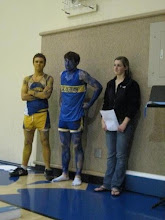Quinn Weber
10-8-09
EPIC ESSAY(S)
Period 3 Intro to college English
Part One- The author and HIS times
The exact date of Beowulf is unknown, the legends of Beowulf are debated as fact or fiction, the poem itself is subject to debate (should it be studied for literary merit or historical fact?), its classification as poem is challenged, even the author of Beowulf is unknown; yet, for all this Beowulf is considered an important piece and is studied internationally by literary scholars and English students alike. This is because of the unique and profound times in which the story was recorded and the interesting blend of the Christian and pagan faiths.
Beowulf is perhaps a Danish or Swedish legend, and perhaps an accounting of a great warrior: a tale from Northern Europe of great deeds and men. Whether the poem is fact or fiction is irrelevant, as somehow this story came to enter the oral tradition of the warmongering Viking people.
The Vikings conducted raids on England from the time of 793AD when Norsemen destroyed the abbey on Lindisfarne and continued until almost 1100 AD. However at about 850, a shift occurred in the Vikings. They began to settle among the English people marrying into local families, giving up there warlike ways to settle as farmers, and most importantly adopting the local religion: Christianity.
Until the Vikings settled in England, they believed in a pagan religion which focused on the glory of ones earthly deed. Only brave warriors could ascend to Valhalla where they would dine among the gods until the day of Ragnarok when they would fight the giants alongside their gods… and lose. This pagan culture is noted in the text of Beowulf obviously in the culture of the warriors that are shown. Beowulf fights Grendel, his mother, and the dragon for honor so he will be granted access to Valhalla. Those who flee from battle are banished even though they were only trying to save their own lives. Even more importantly is the reference to the giants. They are referred to as the ancient race that built the dragon’s lair, and the makers of the sword with which Beowulf slew the hag.
The poem also contains a number of Christian components as well; Beowulf often cries out to “his lord” or states that he was destined to win the battle because of God. I believe that these are in fact inserts that have been placed in the story to accommodate the English peoples Christian culture. Thus the story would have been written down by some English monk or high-person. In this time the ability to read and write was a very rare skill, few outside of the clergy were capable of writing at all let alone transcribing a poem hundreds of lines long. Thus Beowulf must not be treated lightly for it was most likely someone’s life work to record. A member of the clergy who supplemented the story so that it could be better understood among the English people and would spread the Christian faith.
As mentioned earlier the Vikings had begun to settle into England, perhaps the Christian translation of this poem is not an attempt at enabling the English to access it, but rather a way of converting the Vikings into Christians. Monk would have a keen desire to do this because previously the pagan Vikings had been a raider of churches, often selling monks into slavery.
Thus Beowulf in my opinion is an ancient story of the Vikings, a fairy tale perhaps or an accounting of a great warrior which during the conquests of Anglo-Saxon England was transcribed by a Christian influence. Although attempting to use this great poem as a tool for Christianity, the pagan influences are still apparent in subtle details.
Level 8
15 years ago

No comments:
Post a Comment